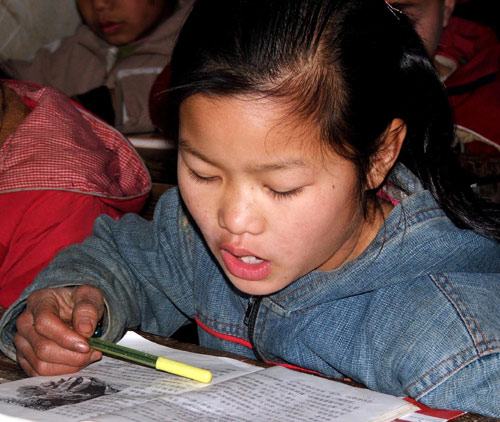|
Compulsory education law under amendment
(Xinhua)
Updated: 2006-02-26 09:46
The draft amendment to China's Law on Compulsory
Education, aiming to ensure a stable investment system for rural education, was
tabled to lawmakers on Saturday for the first review at the beginning of a
four-day legislative session.

Zhao Ting studies
at a primary school in Huaqiao Town, Central China's Hunan Province
February 21, 2006. All the 60 dropouts in the school has been back to
class as China started to offer free education for school kids in the poor
areas. [newsphoto] |
The draft amendment to guarantee a nine-year free education for rural poor
children will be deliberated for three rounds before being enacted.
"Education resources are not distributed fairly. Disparity, existing among
schools and regions, and between cities and the countryside, is growing every
day," said Education Minister Zhou Ji.
The education system, based on the 20-year-old compulsory education law, must
be improved as the disparity of education resources has aroused great concern
and "strong" complaints from the general public, Zhou said.
According to sources close to the legislative session, the draft amendment
placed emphasis on specifying the funding responsibility of central and local
governments for rural schools, which is expected to lift the educational burden
of poverty-stricken rural families and to give rural kids equal opportunities as
their peers in cities.
China enacted the law on compulsory education in 1986, freeing students from
tuition fees in six-year primary school and three-year middle school studies.
But families in some rural areas were burdened with heavy "educational
expenses," including the costs of textbooks, winter heat, and transportation, as
local governments could not set aside enough budget for education.
Urban families and governments of rich regions, on the
other hand, have never been troubled with this headache.
In 1998, government budget for compulsory education in Shanghai was 10 times
that in the central province of Henan. The figure was 50 times higher in 2005,
comparing the budget in Shanghai and that in the countryside of Henan.
The growing wealth gap has started to undermine the people's equal rights to
education, sociologists say.
When children in such metropolis as Beijing and Shanghai
study in schools equipped with planetarium and swimming pools, children in poor
countryside, especially in western China, have to spend their school age in
make-shift schools, besieged with worry they might be forced to drop out for high
costs of schooling.
|